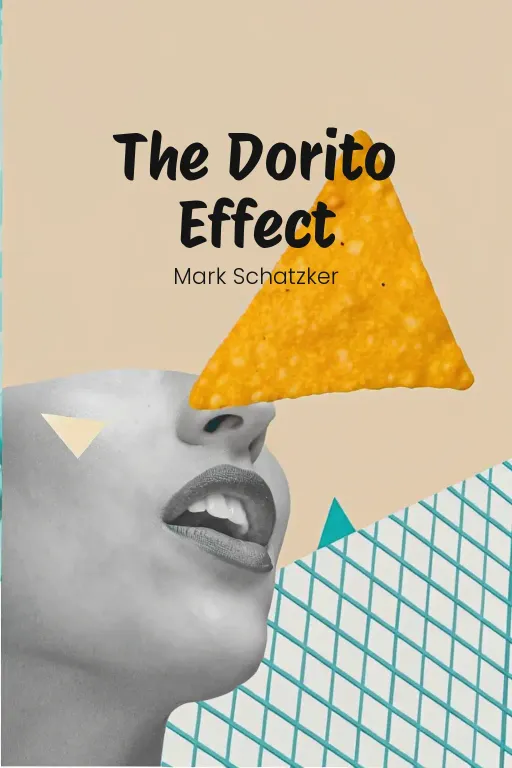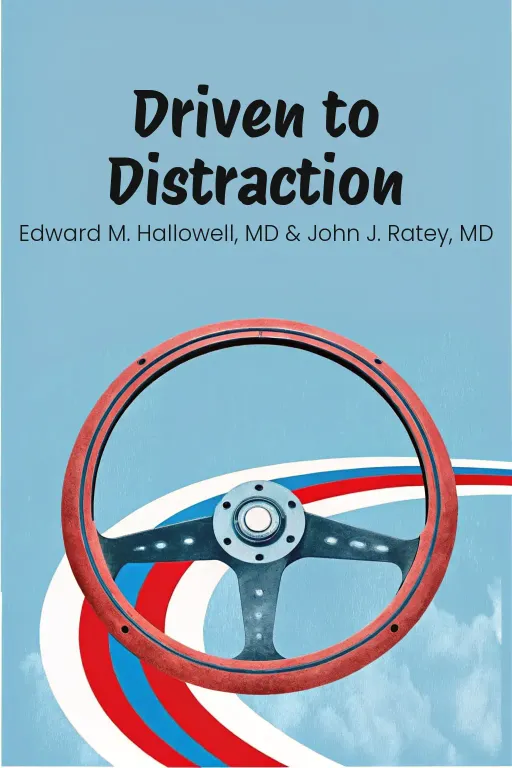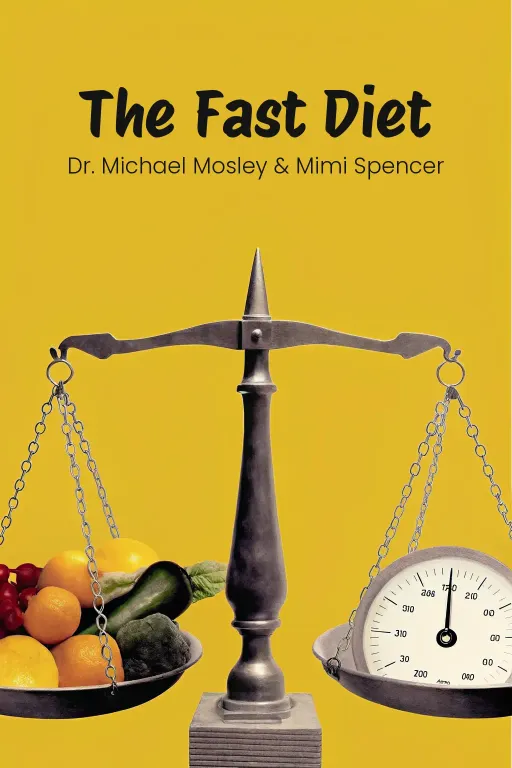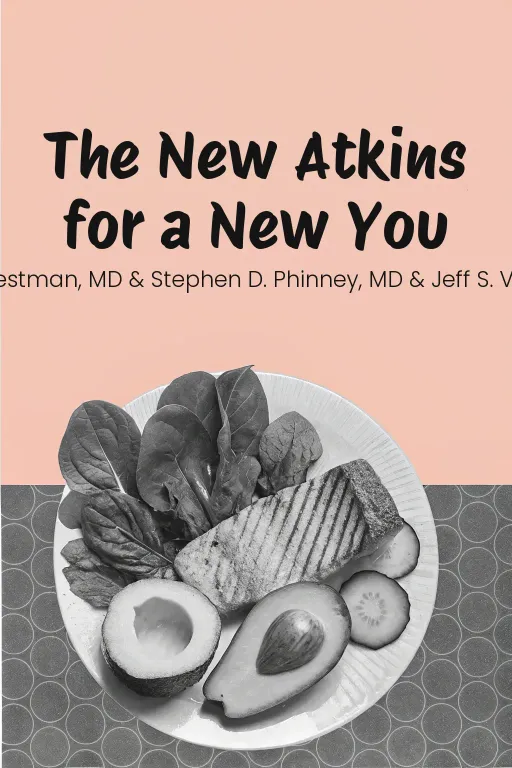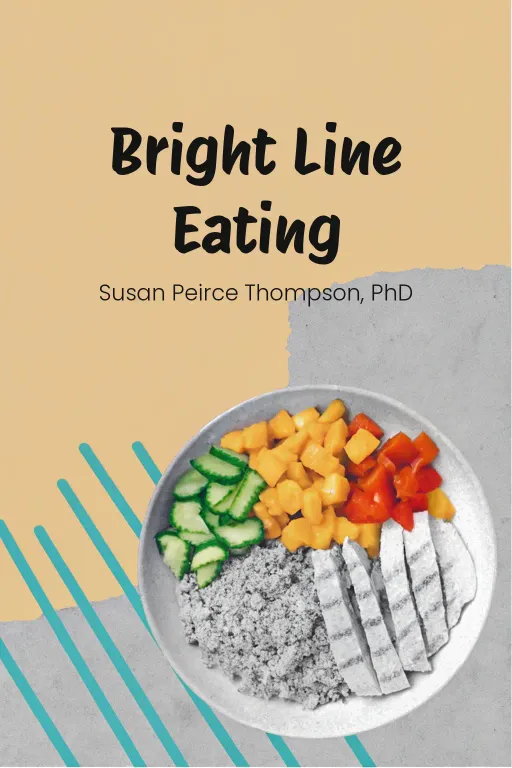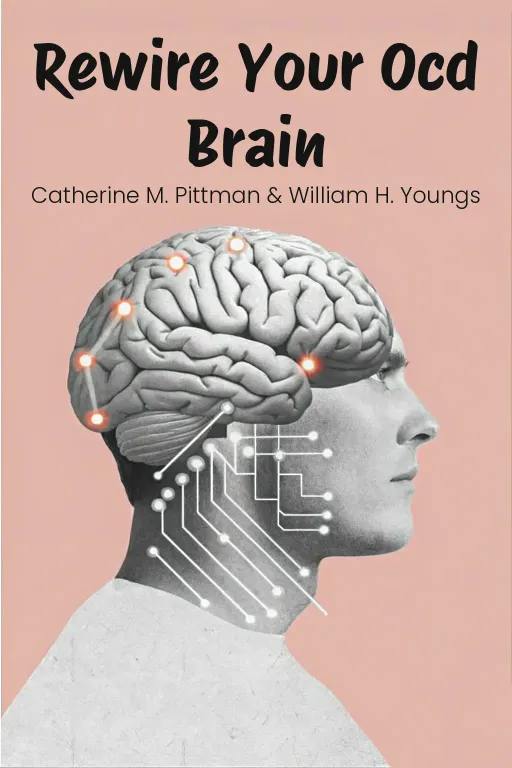
Eat More, Weigh Less: The Nutrient Secret
Podcast by Beta You with Alex and Michelle
The Amazing Nutrient-Rich Program for Fast and Sustained Weight Loss
Eat More, Weigh Less: The Nutrient Secret
Part 1
Alex: Hey everyone, welcome back! Today we're talking about something that can seriously impact your lifespan and how you feel every single day: your diet. Have you ever stopped to think that what you eat could be the most effective way to prevent illness, shed those extra pounds, and just feel amazing? Michelle: Or, you know, maybe it's the reason you're crashing every afternoon or stuck yo-yo dieting. Ring any bells? Alex: You're definitely not alone there, Michelle. So, we’re diving into the power of nutrient density today. And our guide? Dr. Joel Fuhrman's eye-opening book, “Eat to Live”. Michelle: Yeah, Fuhrman doesn't pull any punches. He goes right after the Standard American Diet – the "SAD diet," which is such a suitable name – and points out how it contributes to everything from weight gain to heart problems. His point is that a diet rich in plant-based nutrients can actually reverse a lot of the damage. Pretty strong statement, huh? Alex: It is, but it's all backed by real science! The book doesn't just pick apart the flaws in our eating habits; it gives you a clear plan for losing weight, staying healthy, and feeling energetic for the long haul. Michelle: Okay, so here's what we're going to cover. We'll start with why the Standard American Diet is, well, not doing us any favors. Next, we'll look at Fuhrman's solution—this nutrient-density formula thing—and see why it works. And finally, we'll get down to earth: What does it take to actually make this a sustainable lifestyle? We're talking about real, actionable strategies here. Alex: Exactly – think of this episode as your health blueprint. We’re breaking down everything from major health issues to those everyday food choices you make. Ready to jump in? Let’s do it!
The Pitfalls of the Standard American Diet
Part 2
Alex: Okay, Michelle, let's jump right in. The Standard American Diet, or SAD, it's... well, sadly accurate. Bottom line, it's a disaster for public health. Michelle: A disaster, huh? Alright, Alex, break it down for us. What makes this so-called SAD diet such a train wreck? Alex: Where do I even begin? It’s basically built on processed foods, refined carbs, and unhealthy fats. Imagine a diet high in calories but almost completely lacking essential nutrients—vitamins, minerals, fiber, all the good stuff. Dr. Fuhrman calls it being “overfed, yet malnourished," and that's the core problem – this paradox is “really” doing a number on our bodies. Michelle: Overfed but malnourished… I like that. But let's make this relatable. We all enjoy a bag of chips or a sugary latte now and then, but are they really that bad if it's just part of a balanced diet? Alex: It's more than just the occasional treat, Michelle. The average American consumes about 32 teaspoons of added sugar every single day! That's not just bad for your teeth, it’s a fast track to insulin resistance, weight gain, and chronic diseases like type 2 diabetes and heart disease. And it starts early. Studies, like the Bogalusa Heart Study, have found fatty deposits in the arteries of children as young as five. Five years old, Michelle! Michelle: Wow, that's intense. Grade schoolers already on the road to cardiovascular disease. I'm guessing this isn't from hitting the drive-thru after soccer practice, but from the food marketed to them, right? Alex: Exactly! Sugary cereals, sodas, snacks marketed as "fun" or "kid-friendly," but they're basically pre-packaged health risks. And it’s not just kids, adults are stuck in the same cycle. These foods cause blood sugar spikes, followed by energy crashes, leading to cravings for—you guessed it—more unhealthy foods. It's a vicious cycle. Michelle: Okay, I'm picturing a hamster spinning endlessly in a wheel. To get off that wheel, don’t you need to understand what's driving you in the first place? Do you think it’s just bad choices and bad marketing, or is it deeper than that? What about the emotional side of this? Alex: Oh, there's so much more to it. Obesity – the most obvious symptom of SAD – has consequences beyond physical health. Let's get some numbers in here: medical costs related to obesity in the U.S. are over $147 billion a year, according to the CDC. But beyond the money, think about the mental health toll. Obesity can lead to low self-esteem, social isolation, and depression. Michelle: And it's not just adults who are affected, right? Kids aren’t immune to the stigma either. We’ve all heard stories of kids being bullied or struggling with their mental health because of their weight. It’s heartbreaking, and it all goes back to diet. Alex: Exactly. Chronic diseases are the next level. People are being debilitated by illnesses that could've been stopped with proper nutrition. Take Peggy Fennell’s mother, for example. She spent fifteen years battling diabetes, dependent on insulin. Then, she switched to a nutrient-dense diet, lost 58 pounds and no longer needed insulin. That shows you the real power of food Michelle: Alright, you’re tugging at my heartstrings now. But we need to address quick fixes. People hear stories like Peggy’s and immediately sign up for the latest fad diet. Keto, low-carb, low-fat, celery juice cleanses... you name it! Why don’t these “really” work? Alex: Dr. Fuhrman is pretty critical of those diets, and for good reason. The problem is, they focus on restriction, not nourishment. High-protein or low-carb diets can lead to short-term weight loss, but they don’t actually address the root cause: poor nutrition. And don’t even get me started on “diet” foods. They’re often full of added sugar to make up for the lack of fat, which defeats the entire purpose. Michelle: So you’re saying swapping regular cookies for “low-fat” cookies isn’t the magic bullet people hope it is? Got it. It feels like we’re all just stuck counting calories and controlling portions, only to crash when hunger and cravings hit back harder. Alex: Exactly. That’s why Dr. Fuhrman says we need to shift towards eating nutrient-dense foods—foods that have the highest nutrition-to-calorie ratios. Think leafy greens, colorful veggies, fresh fruits, legumes, whole grains. Because those foods fill you up, and they actually meet your body’s nutritional needs. Michelle: That's the part I think most people miss. It’s not just about eating less; it’s about eating better. But Alex, what about people who live in food deserts or where fresh produce is a luxury? How do we address that bigger, systemic issue? Alex: It’s a critical point, Michelle. Processed foods are often the cheapest and most accessible options, especially for low-income families. So, addressing the SAD is not just about individual responsibility, it’s a public health issue. Policies need to change to make nutrient-dense foods more affordable and accessible. But on the individual level, Dr. Fuhrman suggests starting small, like replacing even just one processed meal a day with something wholesome. Little steps can definitely add up over time. Michelle: Fair enough. “Small steps” aside, it sounds like a call to rethink how we view nutrition, shifting it from something we survive on to something we thrive on. And that starts with education, doesn’t it?
The Science of Nutrient-Dense, Plant-Based Eating
Part 3
Alex: Exactly, Michelle. And that's “really” the core of Dr. Fuhrman's work… a total rethinking of how we approach food. He “really” hones in on nutrient density. Instead of fixating on calories or some restrictive diet, the focus is on flooding your body with what it actually craves: vitamins, minerals, fiber, and those incredible phytochemicals from plant-based foods. Michelle: "Nutrient density"—let's break that down. It sounds science-y, but what does it mean day-to-day? How do we even measure that, and why is it so key to Fuhrman's whole deal? Alex: Good clarification, Michelle. Nutrient density means how many essential nutrients you get from a food compared to how many calories it has. So, foods loaded with nutrients but light on calories—think kale, spinach, broccoli—they're high on the nutrient density scale. On the flip side, things like soda or chips, packed with calories but almost zero nutrients, are at the very bottom. Michelle: So, it's like comparing real gold to chocolate coins. Looks the same, similar size, but one has real value. Alex: Exactly, Michelle. When you load up on high-nutrient foods, you're not just fueling your body… you're also more likely to feel satisfied. That's because your body isn't constantly sending out hunger signals trying to get those missing nutrients. Which is exactly what happens when you lean on calorie-dense, nutritionally empty foods. Michelle: Okay, I get it. But here's the thing: We're wired to crave high-calorie foods, right? I mean, our ancestors weren't after spinach; they wanted fats, meat, anything to get them through those tough winters. Doesn't that natural drive clash with Fuhrman's recommendations? Alex: Good point. The world our ancestors lived in is so different from today. Back then, high-calorie foods were rare, finding them took work, like hunting or foraging. Now, we're swamped with processed, calorie-rich foods that are cheap and addictive. Fuhrman argues that modern diets have hijacked our biology by playing on those old cravings. Michelle: So, we're stuck in a conflict—our natural instincts versus a food industry designed to profit from those instincts. And it results in chronic inflammation, insulin resistance, all sorts of health issues. Alex: Absolutely. That's where nutrient-dense, plant-based eating comes in. We evolve not by cutting back, but by giving our bodies what they truly need. Transformative. Picture this: instead of refined carbs, you pick whole grains; you add legumes instead of processed snacks; you choose leafy greens over fries. You're actively reversing the damage. It's not just about stopping disease; it's about helping your body heal. Michelle: That's huge. Speaking of leafy greens, Fuhrman seems obsessed with raw vegetables. Why the big push for raw foods? I mean, there's only so much salad a person can eat, right? Alex: Valid point! The whole raw foods thing is about getting those concentrated phytochemicals—those amazing plant compounds that protect cells, fight inflammation, and even cut your risk of diseases like cancer. Problem is, many of these phytochemicals are heat-sensitive, cooking can break them down. Studies show that boiling veggies can cut certain vitamins, like vitamin C, by more than half. Michelle: I can already hear people switching off. Do we have to turn into raw food fanatics to meet Fuhrman's standards, or is there some flexibility? Alex: Thankfully, no, you don't need to go 100% raw. Fuhrman knows that not all nutrients are destroyed by cooking; in fact, some veggies, like tomatoes, cooking can boost certain nutrients, like lycopene. It’s about balance. Mix raw and cooked to get benefits from both. Michelle: Good, because I was picturing a lifetime of carrot sticks and celery. Speaking of sticking with it, how sustainable is it to completely change your diet, especially for people who are used to certain cultural or convenient foods? Alex: It’s definitely a challenge, but Dr. Fuhrman addresses this with understanding. He advises starting gradually—maybe adding one big salad each day or swapping a processed snack for some fresh fruit or nuts. As your taste buds and habits change, those small adjustments build into something bigger. Michelle: Okay, and what about the cost? Let’s be real—nuts, organic fruits, fresh veggies... it adds up, especially if you’re on a budget. Alex: Cost can be a problem, but it doesn’t have to be impossible. Fuhrman points out that the most nutrient-dense foods—beans, lentils, frozen vegetables, whole grains—they’re often the most affordable. You don’t need fancy ingredients for this. Plus, investing in your health can save you money by cutting medical expenses from chronic diseases. Remember Peggy Fennell's mom? Seeing how much was saved by ditching insulin after adopting a new habit. Michelle: Great point. I guess it's not just about what you're spending at the grocery store, but also what you're saving—your health, your energy, maybe even your lifespan. That's quite an amazing return. Alex: Absolutely. It starts with what you eat. Every meal is a chance to nourish your body, prevent disease, and build a better, healthier future.
Practical Strategies for Transitioning and Sustaining Health
Part 4
Alex: Okay, so we've covered the science, right? Now let's get practical. Dr. Fuhrman is great at taking all that research about nutrient density and reversing chronic disease and turning it into actionable steps for people. Michelle: Right, because let's be honest, knowing something and actually “doing” it are two totally different things. The real question is, how do you get someone to change their ingrained eating habits without overwhelming them and losing them along the way? Alex: Exactly! So that’s why we're shifting our focus to "Practical Strategies for Transitioning and Sustaining Health." We're not in theory-land anymore, we're talking tools to make real, tangible changes to your diet and lifestyle. Michelle: Alright, so let's dive right in – his six-week structured meal plan. If you were walking someone through this for the first time, what does it actually look like? Alex: Think of it as a reset button. It's a structured plan to transition people from a typical processed diet to a nutrient-dense, plant-focused one. The core of it is eating unlimited, non-starchy vegetables – things like kale, zucchini, peppers, broccoli – alongside moderate portions of legumes and limited starchy foods, like potatoes or grains. The goal is to maximize vitamins, fiber, and antioxidants while minimizing empty calories. Michelle: Unlimited veggies, huh? So, technically, if I showed up at a party with a wheelbarrow full of spinach, I’d be following the plan? Alex: More or less! But seriously, it's a shift in perspective. Most diets are about restriction – what you “can't” eat. Fuhrman flips that around to focus on abundance – eating “more” of the foods that nourish your body and fill you up. Michelle: Alright, I appreciate the optimism, but let’s be real. What motivates people to actually stick with this? Is it just weight loss, or is there more to it? Alex: Weight loss is definitely one of the first things people notice, but it goes way beyond that. It's about recalibrating your entire relationship with food. Fuhrman explains that these hyper-palatable processed foods actually distort your taste buds over time. So, by eating nutrient-dense, whole foods for six weeks, your taste preferences actually start to shift. You start wanting a juicy mango instead of a bag of chips. Michelle: So, almost like a palate detox, then? Alex: Exactly! And people see huge improvements in their blood pressure, cholesterol, even chronic pain. Success stories like Linda and Rob Castagna are so inspiring. They struggled with asthma, hypertension and obesity and are now healthier, medication-free, and thriving within just months of following Fuhrman’s recommendations. Michelle: Hard to argue with those kinds of results. But let’s cut to the chase here – meal time. Recipes can make or break a diet. Does Fuhrman offer ideas that don't feel, you know, bland or repetitive? Alex: Oh, the recipes are actually one of my favorite parts! They really showcase how creative and flavorful plant-based eating can be. For example, there's a "Rainbow Salad with Citrus Dressing" – bright colors, fresh textures, and a tangy orange vinaigrette that even skeptics will get excited about. Michelle: Okay, but a salad's not going to win over “everyone” at the dinner table. What about something a little heartier? Alex: Then there’s the Sweet Potato and Black Bean Chili. Hearty, packed with flavor, and loaded with fiber and protein. It's comfort food reinvented — without all the heaviness. Michelle: Okay, now you're talking my language. And for those of us with a sweet tooth, I'm assuming it's not just cold turkey, right? We're still talking dessert options here? Alex: Absolutely! One simple option he suggests is a Banana-Berry Smoothie – it satisfies your sugar cravings naturally with ripe fruit instead of added sugar. Indulgent “and” nutrient-packed. Michelle: Okay, points for creativity. But, of course, the elephant in the room for so many people isn’t just recipes – it’s their emotional connection to food. Let's get into that. How does Fuhrman tackle emotional eating and food addiction? Alex: This is a really critical area he dives into. Emotional eating comes from habits we've built over time — turning to food for comfort, boredom, or stress relief. He suggests recognizing your triggers as the first step. Keeping a food diary, for example, helps you track not just “what” you eat, but “why” you eat it. Michelle: So if someone's polishing off a pint of ice cream after a rough day, they can look back and realize, "Oh, I wasn't actually hungry. I was just upset about that work thing." Alex: Exactly. And from there, he encourages replacing those habits with healthier coping strategies – a quick walk, yoga, calling a friend. It’s about rewiring those automatic responses that lead to poor food choices. Michelle: Makes sense. But let me push back slightly here – tracking triggers and meditating isn't exactly revolutionary advice. What sets “his” approach apart? Alex: The real difference is in combining those emotional strategies with nutrient-dense eating. Once you're properly nourished, those intense cravings that drive emotional eating actually lessen over time. Peggy Fennell's story really illustrates this well. Her family was struggling with all sorts of health issues — her mom had diabetes, Peggy had asthma — but once they switched to a nutrient-dense diet, their health improved dramatically. And just as importantly, food just didn't have that same emotional grip on them anymore. Michelle: Sounds almost... freeing. Like, once you address the nutrition side, the emotional aspect becomes easier to manage. Alex: Exactly. And that's where support systems come into play, too. Fuhrman emphasizes building a network – whether it’s joining an online forum, a local plant-based meet-up group, or just sharing recipes with friends. Accountability really helps with long-term success. Michelle: So it’s like that healthy eating community becomes your safety net when the cravings sneak back in or your motivation dips. Alex: Spot on! And, speaking of the long-term, he also talks about how to gently reintroduce foods you've been limiting. Reintroducing small portions of whole grains or starchy vegetables which complement, rather than replace, the plant-based focus. Michelle: So you're never stuck on this rigid "perfect diet" forever, but you maintain the core of high-nutrient eating. It’s flexible, sustainable, and something people can actually stick with. Alex: Exactly – it's not about perfection, it's about progress. Gradually learning how to make better choices, addressing those emotional connections to food, and building habits that sustain your health long-term. It's transformative in every sense of the word.
Conclusion
Part 5
Alex: So, to sum things up then, we really covered a lot today. We talked about the, frankly, devastating impact of the Standard American Diet on public health, and then, Dr. Fuhrman's proposed solution: a nutrient-dense, plant-based diet just overflowing with vitamins, minerals, and those life-saving phytochemicals. Michelle: Exactly, and we really broke down the key ideas, didn't we? Like, why simply counting calories is missing the forest for the trees. How focusing on nutrient density totally changes the game. And practical emotional and behavioral strategies people can use to really make these sorts of changes stick. Also, we even touched on how to make this work in the real world with recipes, meal plans, and even solutions for affordability and access to healthy food. Alex: Right, and really, the biggest takeaway is that food is more than just fuel, right? It's actually medicine. Every single bite is an opportunity to nourish your body, prevent disease, and ultimately, just improve your quality of life. It's all about making really conscious choices that are aligned with your health goals. Michelle: Look, I know this all sounds like a lot, and might feel overwhelming, so, if you're feeling that way, just start small. Maybe it's just incorporating one big salad into your daily life, or swapping out those chips for a handful of nuts. Or even just becoming more mindful of why you're eating in the first place. It’s really these small shifts that pave the way for the more profound transformations. Alex: Absolutely. I mean, Dr. Fuhrman says it best: "Health is earned, and it starts with one step at a time.” Remember, your plate holds incredible power. So, use it to thrive, not just survive. Michelle: Alright everyone, let's keep this in mind, and take a look down and think about what's on your plate. Just take one practical step today to embrace nutrient density, and you might just find that you change your life.
